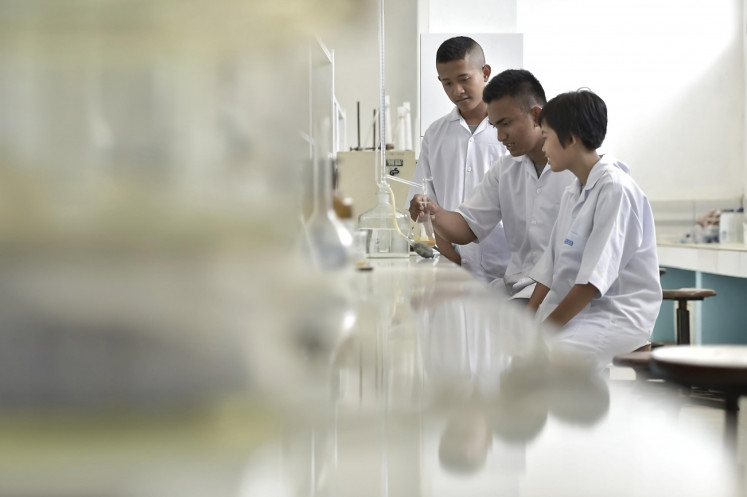Popular Reads
Top Results
Can't find what you're looking for?
View all search resultsPopular Reads
Top Results
Can't find what you're looking for?
View all search resultsInnovation in health independence: Nucleopad, a rapid solution for infection detection
Change text size
Gift Premium Articles
to Anyone
“Nucleopad can deliver results in just 15 minutes, and it doesn’t require complex lab equipment,” said Muhammad Yusuf, a healthcare innovator from Padjadjaran University.
The development of rapid infection testing tools like Nucleopad offers significant benefits to the public. In the management of infectious diseases such as tuberculosis (TB), dengue fever and chikungunya, time is critical for diagnosis and appropriate treatment. Nucleopad simplifies and speeds up the detection process, which traditionally involves time-consuming procedures and advanced equipment.
Driven by the vision to enhance Indonesia’s healthcare independence, Padjadjaran University, in collaboration with PT Pakar Biomedika Indonesia, has made a breakthrough through its Teaching Factory program. One of their flagship products is Nucleopad, a paper-based in vitro immunochromatography tool designed to detect amplified DNA through polymerase chain reaction (PCR). This innovative device offers a fast, accurate and simple detection method without requiring sophisticated lab equipment.
“With this product, we can detect infectious diseases like TB more efficiently, which will greatly help in disease management,” said Yusuf.
The Nucleopad project is supported by the 2023 Matching Fund from the Ministry of Education, Culture, Research, and Technology (Kemendikbudristek) with funding of Rp 1.3 billion, supplemented by nearly equivalent contributions from industry partners. Nucleopad is positioned as a quick diagnostic tool for diseases like dengue, chikungunya, and tuberculosis.
A Nucleopad test provides visual results in the form of a red color, visible to the naked eye, eliminating the need for agarose gel as used in conventional methods. The product is also eco-friendly, reducing the use of chemicals in PCR visualization. Nucleopad boasts 75 percent sensitivity and 95 percent specificity, outperforming traditional electrophoresis visualization methods, which offer only 60 percent sensitivity.
This innovation not only reduces the cost of diagnostic tools but also accelerates the diagnosis and treatment of infectious diseases.
Products like Nucleopad improve the efficiency of healthcare providers and expand public access to affordable diagnostic technology. As a locally developed product, Nucleopad contributes to Indonesia’s independence in meeting diagnostic needs without relying on imported products.
“We believe this innovation will promote healthcare independence in Indonesia and reduce reliance on imported diagnostic tools,” Yusuf stated.
Teaching Factory: Bridging academia and industry
Muhammad Yusuf, the lead innovator and head of the Nucleopad research team, highlighted the importance of the Teaching Factory in fostering innovation. This facility bridges academia and industry by enhancing human resource skills and enabling the development of locally manufactured products that address pressing industrial needs, such as diagnostic tools.
“Through the Teaching Factory, we aim to create a workforce that is not only skilled but also capable of innovation,” Yusuf explained.
“Our collaboration with industry accelerates technology transfer, increasing the local content in diagnostic tools and helping Indonesia achieve self-reliance in healthcare,” he added.
As an educational institution committed to producing competent human resources, Padjadjaran University collaborates with PT Pakar Biomedika Indonesia to provide facilities, equipment and industrial guidance for the development of innovative diagnostic tools. This collaboration strengthens Indonesia’s healthcare independence, particularly in the production of diagnostic devices.
Indonesia faces significant challenges in achieving healthcare independence. In 2020, approximately 90 percent of pharmaceutical raw materials were imported, and the country heavily relied on imported medical devices for most healthcare needs. Local innovations like Nucleopad play a critical role in reducing this dependence and boosting domestic production capabilities.
The Indonesian Export Development Agency (LPEI) reported that medical device imports reached US$1.1 billion in 2021, a figure that has grown in recent years. By developing local products, Indonesia has a great opportunity to reduce these imports and enhance the competitiveness of its healthcare industry in the global market.
Strengthening healthcare independence and global competitiveness
The Teaching Factory at Padjadjaran University exemplifies how collaboration between academia and industry can produce impactful innovations for public health. Continuous research and the development of products like Nucleopad bring Indonesia closer to achieving healthcare self-reliance and open new opportunities for competing internationally.
The Matching Fund and Kedaireka programs, launched in 2020 as part of the sixth episode of the “Merdeka Belajar” (Freedom to Learn) initiative, have shown positive outcomes. Research collaborations between universities and industries have increased significantly, with research proposals rising from 1,200 in 2021 to 5,600 in 2023. Research funding has also grown by 420 percent, contributing to Indonesia’s rise in the Global Innovation Index from 87th in 2021 to 61st in 2024.
Abdul Haris, director general of higher education, research, and technology at Kemendikbudristek, emphasized the importance of innovation for national development, especially in driving economic growth, enhancing competitiveness, and promoting self-reliance.
“Collaboration between universities and industry has great potential for creating superior innovations and effective solutions. Kedaireka serves as a hub that connects academic expertise with the resources of strategic industry partners,” said Haris.
Innovations that foster national independence are vital for building a stronger, more self-reliant healthcare ecosystem. They also demonstrate how synergy between academic research and industry can bring tangible benefits to society.











